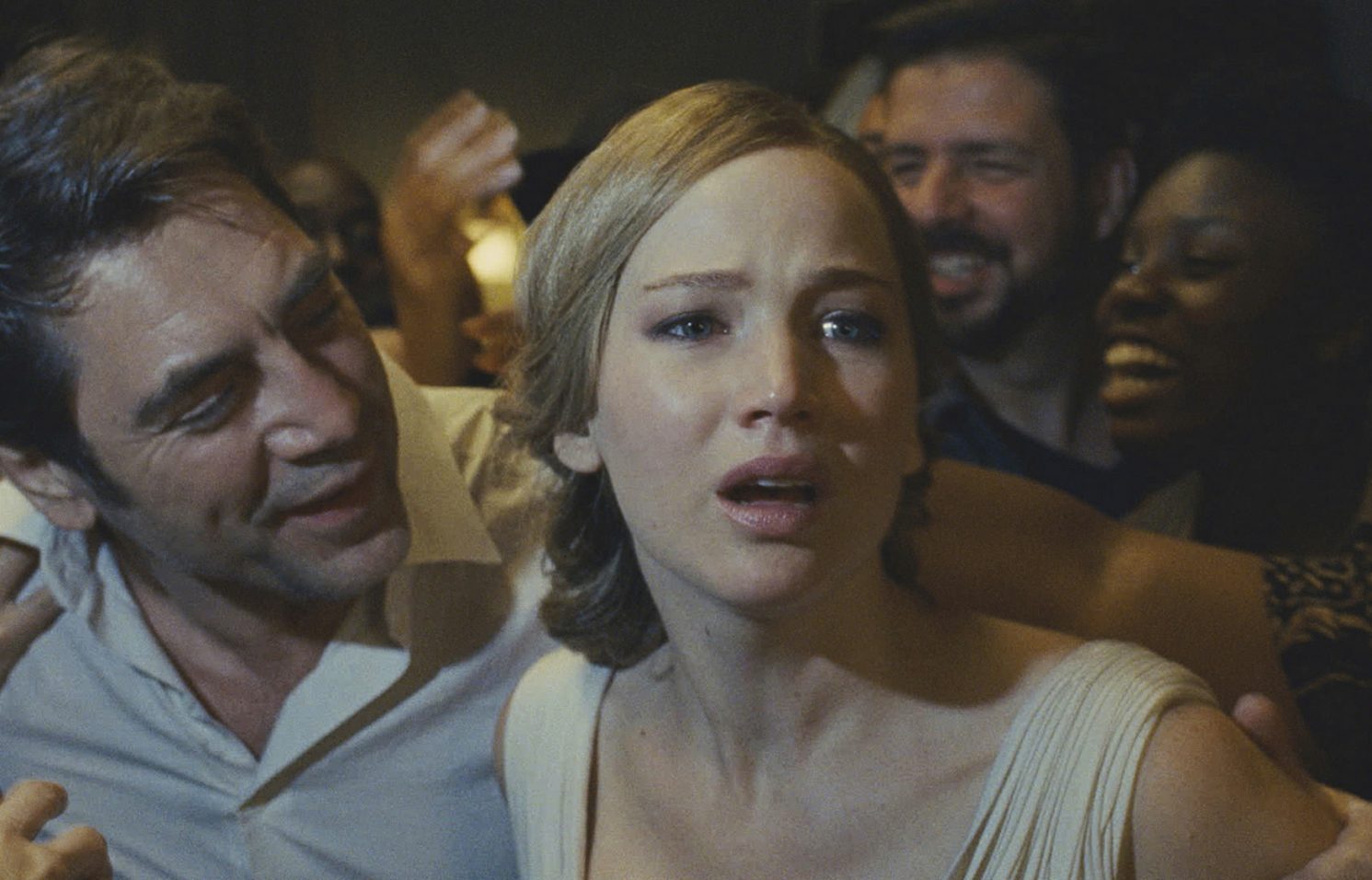Advertisement
Review
'Mother!' Is A Provocative, Swirling Contemplation On Our Relationship With The Earth

Biblical allegories and weighty world matters abound in Darren Aronofsky’s latest tempest of anger and wonderment that takes humans to task. Part horror story, part existential ponderance and ever doing cinematic backflips, "mother!" is a movie that certainly won’t be everyone’s cup of tea. But those who see it will be held rapt from the very first frame to the film’s fiery crescendo.
Things begin serenely enough as we catch up with a young woman immersed in restoring a grand country manse, where there's no cell service and nothing but trees and grass as far as the eye can see. The woman is never identified onscreen, but called "Mother" in the credits -- and Jennifer Lawrence carries her heavy emotional burden well.
Her selection of earth tones to plaster the walls is of no coincidence. She tends quietly to these finishing aesthetics as her husband (Javier Bardem), identified in the credits simply as "Him," broods about struggling to reboot his creative juices. He’s a beloved poet who’s been blocked since the death of his previous wife and is wildly possessive of the crystalline shrine he has erected in his study to memorialize her.
His aloof peculiarity strikes a chord early, but then again he’s a creator and, as with anyone whose artistic process breeds success, idiosyncratic methods often get overlooked. Then "Man" (Ed Harris) shows up, believing the stately octagon shaped estate is a B&B. The two men get bombed as if they’re old friends and later, Man wretches up an organ. Then there’s that troubling picture of Him that Mother finds in Man's bag.
The weird party has only just begun when Man's wife, "Woman" (a game and seamlessly sinister Michelle Pfeiffer) arrives to riddle Mother about sex and children before openly fornicating with Man — as if to show Mother how it’s done. And if that’s not enough, the family gathering expands to include their two sons (Brian Gleeson and Domhnall Gleeson). Before you can say Cain and Abel, there’s bloodshed, a brief lull and then the mourning party from hell as scores of random people pop through the door, imbibe alcohol and then proceed to tear the house apart with boorish glee. Through it all, Him resists Mother's pleas to kick them out and instead draws them closer, claiming sympathy and a source of inspiration. What’s his deal you might wonder, and why would he forsake his wife?
Ultimately Mother becomes pregnant and that’s when all hell breaks loose — almost literally — as Aronofsky takes the very stagy format and hurls it off the tracks and into a gonzo abyss that becomes Mother's personal Grand Guignol, and probably the reason for that trailing exclamation mark in the title. To say any more about the plot, except that scores of adoring poetry fans flock to the fields outside and Kristen Wiig enters as a publicist skilled in torture tactics, would be a sin.
Aronofsky’s always been one to immerse the viewer into the harrowing plight of his protagonist, be it downward spiraling drug addicts in “Requiem for a Dream” (2000) or the delusional ballerina in “Black Swan” (2010) that scored Natalie Portman an Oscar, and that doesn't change here.
The camera, in the hands of cinematographer Matthew Libatique who again does fantastic work for his longtime collaborator, clings to Mother's shoulder, constantly turning and swiveling as she rushes up and down the spiral staircase of the octagonal structure, bouncing from one hateful indignation to the next. It’s a dizzying effect that reaches its breaking point as the claustrophobic mayhem breaks out. Given the piquant burn of “Black Swan” that blurred the line between reality and imagination, one might think that much of what’s going on in “mother!” might be waking nightmares — they certainly feel that way. But as the film builds and begins to show more and more plot morsels akin to Roman Polanski’s “Rosemary’s Baby,” you know this is really happening.
As much as "mother!" and "Rosemary's Baby" share a similar bone structure, they’re from different continents. Polanski’s 1968 classic revolved around members of the occult who were debonair, suave and polite; in “mother!” faithful worshipers prove more hazardous than a ravenous zombie herd on steroids.
A few years ago, Aronofsky, Jewish by birth, made the biblical epic “Noah” — openly stating that the film was as much an ecological illumination as it was a cinematic telling of religious lore. If that point was too subtle in that film, it’s not so much with "mother!" It takes a while to register, but Man irreverently smoking in the house and littering — ever ignoring Mother's rebukes — is the tip of the iceberg. The house becomes fair game, consumable for all who come — how much can it give, you ask yourself. It creaks and groans like Noah’s Ark upon the high seas as Mother traverses it forlorn, lost and ever on the precipice of peril. And she’s also able to commune with it, giving it a check up of sorts by leaning an ear to a wall to gauge the condition of the structure’s heart — garnering a graphic illustration that changes throughout the cyclical journey.
In the end, Aronofsky has tossed a lot out there — perhaps too much. A plethora of metaphors and mixed meanings will keep viewers' minds aswirl like Mother on those ceaseless stairs. Aronofsky’s “The Fountain” (2006) and Terrence Malick’s hypnotically wonderful “The Tree of Life” (2011) postured something profound and elusive, yet open to personal interpretation. “mother!” falls into that category too, but because of its baroque, in-your-face denouement you become overwhelmed by the ever-expanding spectacle — provocative, grotesque and unforgettable.
